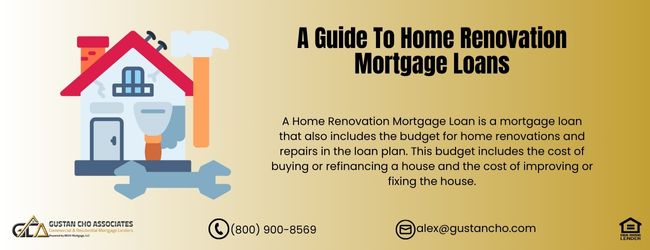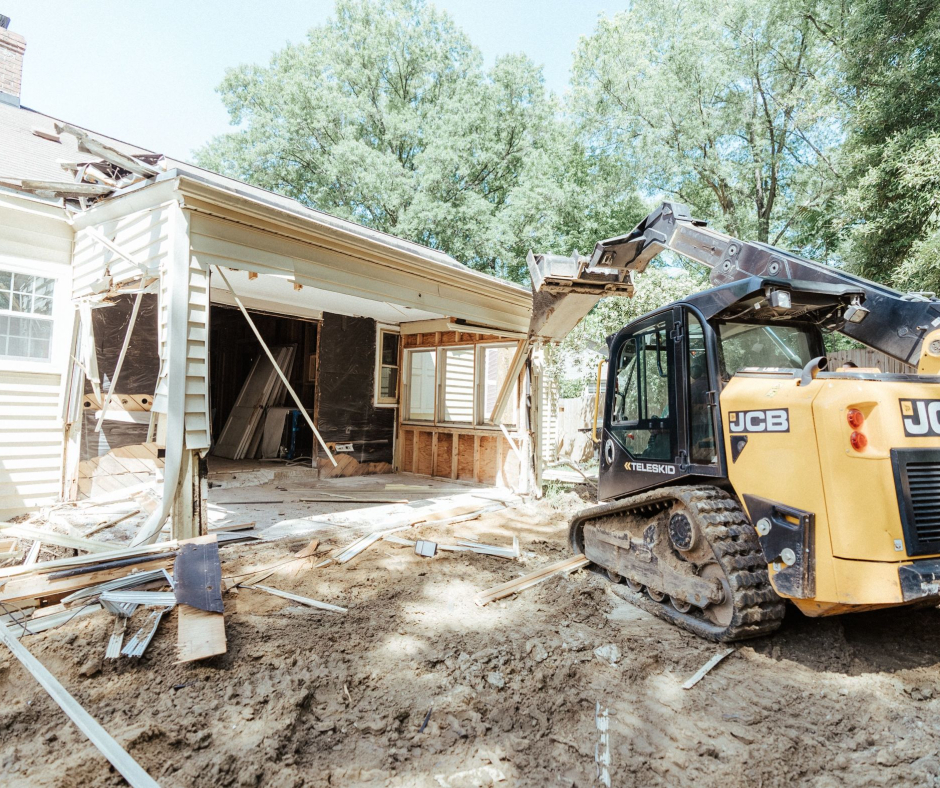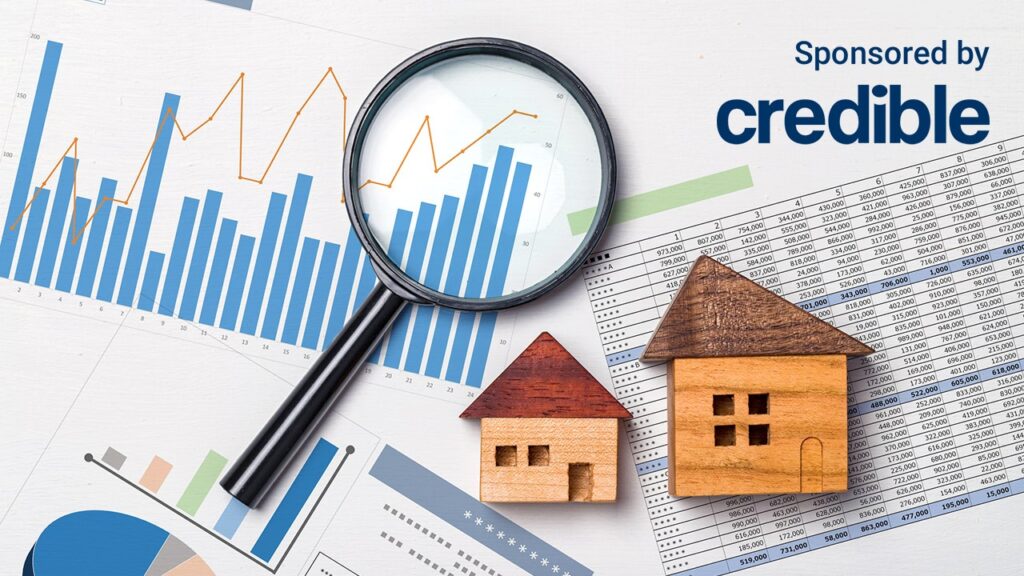A Guide To Home Renovation Mortgage Loans

Home renovation mortgage loans have many benefits during a hot housing market. Many homeowners considering upgrading their homes have difficulty during a seller’s market where rates are over 7% with out-of-control inflation and low housing inventory. Why not renovate your home instead of selling and buying another home? If you don’t have the cash on hand to fund the project? Taking out a renovation loan may be your best option, explains John Strange, a senior loan officer specializing in home renovation loans at GCA Mortgage Group:
There are many types of home renovation mortgage loans homeowners can choose from. Every renovation loan program has its own lending requirements.
Consider a few things before you sign on the dotted line. One of the first things to think about is your total budget. How much money do you need to complete the renovation project, and how much can you repay each month? It’s essential to create a comprehensive budget that accounts for all the costs associated with the renovation, including materials, labor, and any permits or fees. Putting together a budget will give you a clear plan of how much you need to borrow and how much you can repay.
What Are Home Renovation Mortgage Loans
You can use several types of loans to fund home renovations. FHA 203k loans and one-time new construction loans are actual home renovation mortgage loans, including refinancing the old mortgage and getting a new all-in-one renovation to permanent loan. Homeowners can also consider taking out a cash-out refinance, doing a HELOC, considering a second mortgage, or taking out a personal loan.
Personal loans are considered unsecured loans that can be used for any purpose, while your home secures home equity loans and lines of credit and offer lower interest rates.
Deciding on the right type of loan will depend on your credit score, the amount you need to borrow, and your ability to repay the loan. Again, there are several types of loans you can consider for home renovations, including home equity loans, personal loans, and lines of credit, but each loan type has pros and cons, so it’s essential to research and choose the option that best fits your needs. Home equity loans, for example, may offer lower interest rates but require your home as collateral, while personal loans may have higher interest rates but don’t require collateral. Speak With Our Loan Officer for Home Reenovation Mortgage Loans
How Do Home Renovation Mortgage Loans Work
Not all lenders offer renovation loans, so it’s essential to research and find a lender specializing in this type of loan. Renovation loans typically allow you to borrow more money than a traditional home equity loan, and they often have more flexible terms. You can use a renovation loan for various home updates, such as adding a new room, updating your kitchen, or purchasing and installing a new HVAC system. With an FHA 203k Loan, you can do a complete gut rehab, says Lauren Wright of The Wright Realtor and an associate contributing editor of GCA FORUMS:
There are two different types of FHA 203k loans: streamlined and Standard FHA 203k loans. Homeowners can do a complete gut rehab and room additions with the standard 203k loan.
You care only limited to a $35,000 renovation budget with the streamline FHA203k loan. Before applying for a renovation loan, estimating the total cost of your home renovations is crucial. Evaluating the price will give you a better understanding of how much you’ll need to borrow. Remember to factor in all costs, including materials, labor, and unexpected expenses. Be sure to borrow enough to cover your planned updates, but only borrow what you can comfortably repay.
What Is the costs of home renovation mortgage loans
Just like any loan, renovation loans come with interest rates and fees. It’s vital to compare the different interest rates and costs from multiple lenders to find the best deal. Remember that the interest rates for renovation loans are typically higher than traditional home equity loans since the lender is taking on more risk. Alex Carlucci, a senior loan officer at GCA Mortgage Group, explains the costs of taking out home renovation mortgage loans:
The cost of taking out home renovation mortgage loans varies on the type of loan you take out. If you use credit cards, interest rates will be north of 20% to 30%. This means you will most likely be paying interest payments for a while.
Lenders may also charge fees for application processing, appraisal, and closing costs. Interest rates should be a significant factor in your decision-making process. A lower interest rate can save you thousands of dollars throughout the loan, so shopping around and comparing rates from different lenders is essential. Remember, a lower interest rate is sometimes the best option if it comes with additional fees or charges. A mortgage broker is an excellent place to start, as they usually have many investors to choose from.
Types of Home Renovation Mortgage Loans
Several types of home renovation mortgage loans are available. Each type of home renovation mortgage loans has its features and eligibility requirements. GCA Mortgage Group has traditional and non-QM home renovation mortgage loans. Here’s an overview of the main types and their expected eligibility features:
FHA 203(k) Loan
- Type: Combines home purchase and renovation costs into one loan.
- Eligibility: Minimum 580 FICO score (some may need higher).
- Minimum 3.5% down payment of the repaired value.
- The property must be the main residence.
- Renovation cost has to be at least Five Thousand dollars ($5,000).
Fannie Mae HomeStyle Home Renovation Mortgage Loans
- Type: Conventional loan for purchase and renovation.
- Eligibility: Minimum credit score of 620.
- Minimum 3% down for primary residence.
- It goes toward primary homes, secondary homes, or income properties.
VA Home Renovation Mortgage Loans
- Type: For eligible veterans and service members.
- Eligibility: Eligible under VA loan guidelines.
- There is no specified minimum or maximum amount as long as the property appraises (lenders may impose requirements).
- Zero deposit in most situations.
- The property must be the main residence.
USDA Rural Development Home Renovation Mortgage Loans
- Type: For low-income homeowners in rural areas.
- Eligibility: Must be located in specific rural areas.
- Household income must be less than 50% of the median range in that area.
- They need more resources to borrow affordable loans elsewhere.
Title I Property Improvement Loan
- Type: FHA-insured loan for home improvements.
- Eligibility: There are no minimum credit score criteria (at the lender’s discretion).
- Single-family home loan amounts are available for a maximum of $25,000.
- Owners, as well as non-owner occupants, can benefit from this loan type.
Cash-Out Refinance
- Type: Refinances existing mortgage and gives more money for improvements.
- Eligibility: Generally, the home should have at least 20% equity.
- Lenders have different credit scores, with most requiring at least a 620 score.
- The debt-to-income ratio usually needs to be 50% or lower.
Home Equity Loan or HELOC
- Type: Second mortgage against the equity that exists in the property.
- Eligibility: These typically require that the homeowner has at least fifteen to twenty percent equity in the residence.
- The average credit score ranges from out 620 or higher.
- The debt-to-income ratio usually needs to be 50% or lower.
Considerations for General Eligibility of Most Home Renovation Mortgage Loans
- There is a stable income and employment history.
- A debt-to-income ratio is affirmable by the lender (usually less than 50%).
- Property must qualify for the loan being sought and must satisfy certain standards.
- Renovation plans must be submitted to the lender in advance.
- Requirements of contractor (licensed, insured).
- Remember that specific eligibility requirements can vary by lender and loan program.
- Check with multiple lenders and loan programs to determine your best choice.
Equally important, one may seek the services of a housing counselor or financial planner to determine what type of renovation loan is best for one’s situation. Click here to apply for your mortgage enquiry
Repayment Terms of Home Renovation Mortgage Loans
When taking out a renovation mortgage loans, review the repayment terms carefully. Some lenders may offer longer repayment terms, lowering monthly payments but increasing the total interest paid. On the other hand, a shorter repayment term may result in higher monthly payments but less interest paid overall. Finding a repayment plan that works for your budget and timeline is essential. Chad Burns, a dually licensed realtor and mortgage loan officer at Gustan Cho Associates is a FHA 203k loan expert. Chad explains his thoughts on the best renovation loan for homeowners. Overall, a loan for home renovations can be a smart choice if you have a solid plan and budget.
By finding the right lender, estimating your total costs, comparing rates and fees, and carefully reviewing repayment terms, you can make a well-informed decision and enjoy the home of your dreams.
Loan terms, including the length of the loan and the repayment schedule, can also impact your decision. Longer loan terms may mean you will have lower monthly payments, but you’ll end up paying more in interest over the life of the loan. Shorter loan terms may mean higher monthly payments, but you’ll pay less overall interest. Consider your financial situation and choose the loan terms that work best for you.
Repayment Plan of Home Renovation Loans
Finally, it’s important to have a solid plan for repaying the loan. Ensure you understand the repayment schedule and have a plan for making the payments on time each month. Not paying your loan on time can result in additional fees and damage your credit score, so staying on top of your payments is essential. Homeowners should consider before taking out a home improvement loan the return on investment, says Hector Munoz, a general contractor and associate contributing editor for GCA FORUMS:
Before taking out a loan for home renovations, it’s essential to consider the return on investment. Will the renovations increase the value of your home?
Taking out a loan for home renovations can be a good option if you plan to repay the loan. Before you take out a loan, assessing your ability to repay it is crucial. Consider your monthly budget and how much you can realistically pay each month. Remember that taking out a loan will add to your monthly expenses, so you must ensure you’re not overextending yourself financially. Click here to apply for home renovation loans Today
Finding a Contractor for your home improvement project
Before you take out a loan for home renovations, finding a reputable contractor to do the work is essential. A good contractor can help you determine the project’s scope and estimate the costs. They can also help you determine what kind of loan you will need. Some contractors offer financing options, while others can recommend lenders they have worked with.
How To Get Approved For Home Renovation Mortgage Loans
Taking out a loan for home renovations can be an intelligent financial decision, but it’s essential to consider all the factors before signing on the dotted line. By understanding your budget, choosing the right type of loan, comparing interest rates, selecting the best loan terms, and having a solid repayment plan, you can ensure that your renovation project is a success.
A loan for home renovations is a major decision that should not be taken lightly. It is essential to carefully consider your financial situation and the terms and conditions of the loan.
A home renovation project can be a great investment, but ensuring it aligns with your long-term financial goals is crucial. By following the tips and advice outlined in this article, you can make an informed decision and achieve your home renovation goals without risking your financial future. Remember to seek professional advice if you need more time to take out a loan for home renovations.
Considering the Return on Investment on Home Renovation Mortgage Loans
Suppose you decide to renovate your home and are interested in qualifying for home renovation mortgage loans. In that case, we have vast experience working with buyers to prepare them to purchase their dream homes. We can take you through the entire financing process for your home loan. Lauren Wright, of The Wright Realtor is the director of the Preferred Referral Partner Network at Gustan Cho Associates.
Lauren Wright of The Wright Realtor is a practicing real estate agent as well as the senior associate contributing editor at GCA FORUMS. Lauren Wright can connect you to title companies, loan officers, home inspectors, contractors, attorneys, and real estate agents in your area that can help as needed.
If you have any questions about home renovation mortgage loans or any mortgage-related questions, please call or text Gustan Cho at GCA FORUMS at 262-627-1965. Or email us at GCA FORUMS at gcho@gustancho.com for more information and further assistance. Besides being a dually licensed realtor and an associate contributing editor at GCA FORUMS, Lauren Wright has successfully guided many homeowners through obtaining a renovation home loan. Lauren Wright of The Wright Realtor, based in Chicago, has a nationwide network of preferred realtor referral parnters and represent buyers or sellers. Lauren Wright offers free consultation in 48 states at GCA FORUMS by connecting homeowners, buyers, and sellers to the needed sources. Speak With Our Loan Officer for Mortgage Loans
FAQ on Home Renovation Mortgage Loans
Here are some of the questions that a decent percentage of people ask when it comes to Home Renovation Mortgage Loans:
What Are Home Renovation Mortgage Loans?
- A Home Renovation Mortgage Loan is a mortgage loan that also includes the budget for home renovations and repairs in the loan plan.
- This budget includes the cost of buying or refinancing a house and the cost of improving or fixing the house.
What are the Home Renovation Loans varieties?
- The most common types include FHA 203(k) loans, Fannie Mae’s HomeStyle® Renovation loan, Freddie Mac’s CHOICERenovation® loan, and VA Renovation loans.
Who qualifies for Home Renovation Mortgage Loans?
- The eligibility criteria depend on the loan being applied for.
- Still, most loans require an applicant to have a good credit score, steady employment and income, and a good debt-to-income ratio.
- FHA loans are likely to be less restrictive than conventional home renovation mortgage loans when it comes to replacing them.
What is the maximum amount that can be acceptable under a Home Renovation Loan?
- Typically, the amount to be borrowed is dependent on the projected value of the property after renovations.
- For the FHA 203(k) loan, the maximum limit is generally the lesser of either the total cost of the house inclusive of renovations or one hundred and ten percent of the value given to the improved property by the valuators.
Will a Home Renovation Loan assist me in Doing All the Renovations I want?
- Most of the renovation loan programs available will cover a range of renovations.
- This includes minor and major household renovations.
- However, certain restrictions apply.
- Especially FHA 203(k) loans, which do not allow for luxury enhancements such as swimming pool installations.
What is the procedure for renovating with home renovation mortgage loans?
- Usually, after the closing, the money for the renovations is transferred to an escrow account.
- The contractor is then paid out of this account as the work is done.
- In most cases, the lender tracks the progress and distributes remuneration for the work done.
May I conduct the renovations, or must I have a licensed contractor do it?
- Typically, such remodeling may be performed by someone other than you.
- Instead, lenders recommend that you get a licensed contractor to carry out the renovations to the house.
- Some loans give you the freedom to renovate, but these conditions are more stringent.
What if I exceed the limit of how much I borrowed for the renovation?
- If the costs of renovations exceed the limit that the loan disbursing institution set, you will most probably be paying it from your pocket.
- When entering into a transaction with a home loan institution, you must get an accurate cost for the money that is being borrowed.
What is this Home Renovation Loan approval process?
- Well, to get the desired approval, the individual has to proceed with the loan application.
- Part of the home renovation loan process, there will be required documents such as credit reports, income statements, renovation blueprints, cost quotes from contractors, and, more or less, an appraised value of the specific house.
Can I also incur some other costs after the Home Renovation Mortgage Loans?
- Yes, normally.
- There are extra costs like appraisal, title, and, at times, activity costs, such as supervision of the renovation contract.
- Such costs are generally added to the amount of the loan given.
What’s the usual period it takes for one to get a home renovation loan?
- This is usually longer than the time required for a mortgage.
- This is because the procedure includes many steps, such as evaluating contractors’ estimates and the value after remodeling.
- The normal processing time is 45 to 60 days, though this may differ.
What are the Home Renovation loan interest rates?
- The interest on renovation loans is slightly above a rate and term mortgage.
- This is because the loan refinance places the lenders at more risk.
- Nonetheless, price appreciation according to the product being applied for, one’s credit history score, and the market aspect also affect the variation.
What are the consequences of the owner’s inability to finish the renovations on the specified date?
- Loan terms include an allowance period.
- Typically six months to 1 year.
- If refrains are not finished during this time, it would lead to penalties or a need to renegotiate positions with the lender.
Are there any circumstances in which I would be required to refinance my home renovation loan once I have finished all the work?
- Yes, after the renovation has been affected and the home in question has acquired a higher value.
- There is a possibility of obtaining a standard mortgage to replace the renovation mortgage at a lower interest rate without PMI.
Will a Home Renovation Loan have any tax implications for me as a homeowner?
- In certain situations, the interest on Home Renovation Mortgage Loans may be allowed for tax deduction if the renovations undertaken improve the home’s worth.
- It is advisable to contact a tax expert regarding how a home improvement loan will be reported for tax purposes.
Therefore, these FAQs tackle key areas about Home Renovation Mortgage Loans that potential borrowers would need to be aware of to understand what it entails and what would be required of them.







Responses